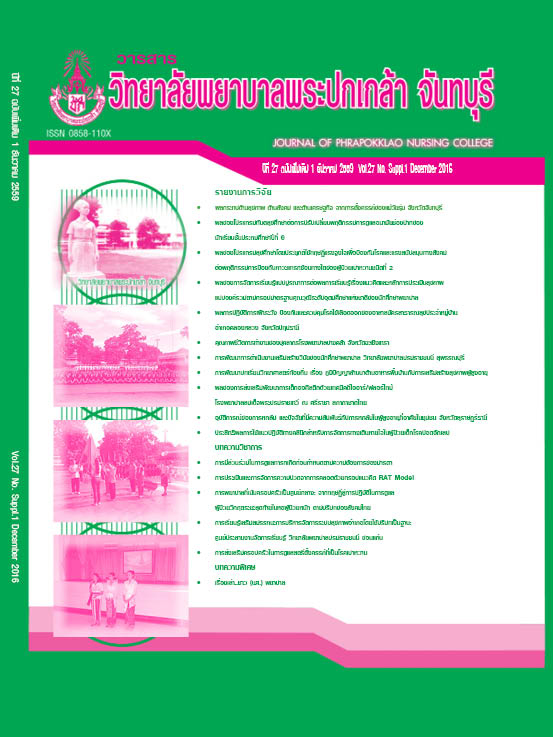Effects of Integrated Learning Method on the Learning Outcomes towards Concept and Principle of Holistic Health Assessment under Thai Qualifications Framework for Higher Education among Nursing Students
Keywords:
Integrated learning method, Holistic health assessment, Thai Qualifications Framework for Higher Education, Nursing studentsAbstract
This classroom research aimed to examine the effects of integrated learning method on the learning outcomes towards concept and principle of holistic health assessment under Thai Qualifications Framework for Higher Education (TQF: HEd) among nursing students. The sample consisted of 68 second year nursing students studying at Prachomklao College of Nursing, Phetchaburi in academic year of 2011. The research instruments consisted of the integrated learning method, a case study, movie, games, the nursing students’ assessment of learning outcomes with the reliability of .97, a test with the difficulty and the discrimination within the range of .31-.74 and .20-.56, respectively, and the learning-based questions. The implementation and data collection were conducted from June to July, 2011. Data were analyzed by using frequency, percentage, mean, standard deviation, and content analysis.
The results were as follows:
1. After finishing the integrated learning method, the overall average scores of learning outcome were at a good level (X = 4.31, SD = .45), and the overall average score of knowledge was at a good level (X = 7.35, SD = .75). Additionally, the overall average score of analytic thinking was at a very good level (X = 8.61, SD = .92).
2. Nursing students were impressive with the integrated learning method, which was divided into 3 aspects such as the learning outcomes, instruction processes, and lecturer’s personalities. In particular, the three items with highest frequency were: ‘learning of holistic condition assessment and understanding of personal difference’ (29.41%), ‘applicability of contents and concepts of holistic assessment in the real situation’ (26.47%), and ‘good teaching techniques and clear explanation of lecturer’ (25%), respectively.
This study suggested that lecturers should provide the integrated learning method in other subjects, intervening concepts of humanized health care, with various teaching methods and interesting learning medias.
References
กระทรวงศึกษาธิการ. (2553). ประกาศกระทรวงศึกษาธิการ เรื่อง มาตรฐานคุณวุฒิระดับปริญญาตรี สาขาพยาบาลศาสตร์ พ.ศ. 2552. สืบค้น วันที่ 16 พฤศจิกายน 2552, จาก http://www.mua.go.th/users/he-commission/doc/law/ministry%20law/1-39%20TQF%20nursing%202552.pdf
ฉวีวรรณ สุวรรณาภา. (2558). การจัดการเรียนรู้แบบบูรณาการเพื่อเสริมทักษะการคิดในรายวิชาสัมมนาสังคมศึกษา ของนิสิตสาขาวิชาสังคมศึกษา มหาวิทยาลัยมหาจุฬาลงกรณราชวิทยาลัย วิทยาเขตแพร่. วารสารสันติศึกษาปริทรรศน์ มจร, 3(2), 1-19.
ชุติมา ปัญญาพินิจนุกูร, จินดามาศ โกศลชื่นวิจิตร, และเกษร สุวิทยะศิริ. (2555). ผลการจัดการเรียนการสอนแบบบูรณาการโดยใช้กระบวนการสะท้อนคิด ต่อสมรรถนะการส่งเสริมการเลิกบุหรี่ ของนักศึกษาพยาบาล วิทยาลัยพยาบาลบรมราชชนนี กรุงเทพ. วารสารการพยาบาลและการศึกษา, 5(2), 130-142.
ทิศนา แขมมณี. (2557). ศาสตร์การสอน: องค์ความรู้เพื่อการจัดกระบวนการเรียนรู้ที่มีประสิทธิภาพ (พิมพ์ครั้งที่ 18). กรุงเทพฯ: สำนักพิมพ์แห่งจุฬาลงกรณ์มหาวิทยาลัย.
ประเวศ วะสี. (2552). สร้างคุณค่าความเป็นคน สร้างสุขภาพชุมชนให้เข้มแข็ง (พิมพ์ครั้งที่ 2). กรุงเทพฯ: คิวทีพี.
พระจักรพงษ์ ทะระมา. (2550). การบูรณาการการสอนไวยากรณ์ในการเขียนแบบเน้นกระบวนการเพื่อส่งเสริมความสามารถในการเขียนภาษาอังกฤษและความรู้ด้านไวยากรณ์ของนักเรียนในระดับก้าวหน้า (วิทยานิพนธ์ปริญญามหาบัณฑิต). มหาวิทยาลัยเชียงใหม่.
มณฑา ชุ่มสุคนธ์, นิลมณี พิทักษ์, และอังคณา ตุงคะสมิต. (2557). การพัฒนาการเรียนการสอนแบบบูรณาการในรายวิชาของสาขาวิชาสังคมศึกษาระดับปริญญาตรีที่ส่งเสริมการเรียนการสอนที่เน้นผู้เรียนเป็นสำคัญ. วารสารวิชาการ Veridian E-Journal, 7(1), 423-435.
สมจิต หนุเจริญกุล. (2552). การบริการสุขภาพด้วยหัวใจของความเป็นมนุษย์. สืบค้น วันที่ 17 มิถุนายน 2554, จาก www. thainurse.org/knowledge/27-29_10_51/PrifDrSomjit.pdf
Arends, R. I. (2015). Learning to teach (10th ed.). Boston: McGraw-Hill.
Jolliffe, W. (2007). Cooperative learning in the classroom: Putting it into practice. London: Paul Chapman.
Joyce, B., Weil, M., & Calhoun, E. (2009). Models of teaching (8th ed.). London: Allyn & Bacon.
Downloads
Published
How to Cite
Issue
Section
License
Copyright (c) 2016 Journal of Phrapokklao Nursing College

This work is licensed under a Creative Commons Attribution-NonCommercial-NoDerivatives 4.0 International License.
เนื้อความ ข้อมูล และรายการอ้างอิงที่ผู้เขียนใช้ในการเขียนบทความเพื่อลงตีพิมพ์ในวารสารวิทยาลัยพยาบาลพระปกเกล้า จันทบุรี ถือเป็นความคิดเห็นและความรับผิดชอบของผู้เขียน คณะผู้จัดทำวารสารไม่จำเป็นต้องเห็นพ้องด้วยหรือร่วมรับผิดชอบ
บทความที่ได้รับการลงตีพิมพ์ในวารสารวิทยาลัยพยาบาลพระปกเกล้า จันทบุรี ถือเป็นลิขสิทธิ์ของวารสารวิทยาลัยพยาบาลพระปกเกล้า จันทบุรี หากหน่วยงานหรือบุคคลใดต้องการนำส่วนหนึ่งหรือทั้งหมดของบทความไปเผยแพร่ต่อเพื่อวัตถุประสงค์ใด ๆ จะต้องได้รับอนุญาตจากบรรณาธิการวารสารก่อน



